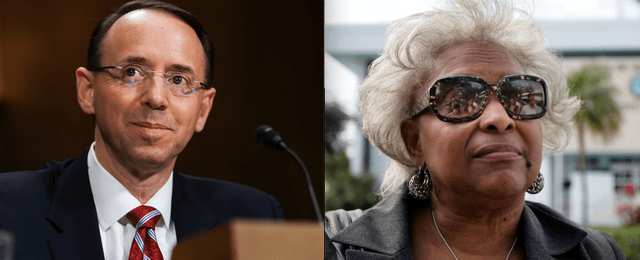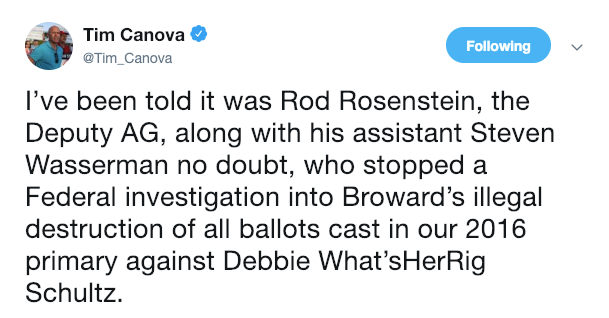Did The Department Of Justice Protect Brenda Snipes From Prosecution For Ballot Destruction?

This article is my own intellectual property and was originally published via Disobedient Media.
A vast caldera of public rage has rightfully been aimed at Debbie Wasserman-Schultz and Brenda Snipes over the last few years. However, it is important to remember that Wasserman-Schultz and Snipes are merely the public faces of an extensive, deeply problematic system of corruption. It is then also essential to understand who, and what mechanisms, have allowed figures like Wasserman-Schultz, Snipes, the Awan brothers, and others to go unprosecuted.
This issue became clearer earlier this week when former congressional candidate Tim Canova Tweeted:

As readers may recall, Snipes illegally destroyed ballots from the 2016 primary race between Wasserman-Schultz and Tim Canova. The Sun Sentinel explained Snipes's direct involvement in the destruction of ballots, writing:
“Canova, who was checking for voting irregularities in the race, sought to look at the paper ballots in March 2017 and took Elections Supervisor Brenda Snipes to court three months later when her office hadn’t fulfilled his request. Snipes approved the destruction of the ballots in September, signing a certification that said no court cases involving the ballots were pending. Snipes called the action a “mistake” during testimony she gave in the case, saying the boxes were mislabeled and there was “nothing on my part that was intentional” about destroying the contested ballots.”
Big League Politics also reported: "On May 11, 2018, the Florida Circuit Court granted Plaintiff Canova summary judgment, and found that Snipes had violated numerous state and federal statutes, including laws punishable as felonies with up to five years in prison. The Court’s ruling made clear that Snipes’ destruction of ballots was illegal on several separate counts.”
Disobedient Media spoke with Tim Canova, who told us:
"I was recently informed by election officials in Florida that it’s the Deputy AG, Rod Rosenstein, who would have been the DOJ official making the decision not to move forward with a criminal investigation in our ballot destruction case. I also believe that Steve Wasserman, an Assistant US Attorney at the DOJ headquarters in Washington, DC, may well have been involved in the decision, particularly since Wasserman spoke out publicly against prosecuting Awan in the days before Awan’s sentencing."A Floridian official set to prosecute Snipes was also said to have backed down after a trip to Washington DC, which involved meetings with the DOJ. Canova stated:
"Last May, the acting US Attorney for South Florida, Ben Greenberg, was about to open a criminal investigation into Snipes’s destruction of our ballots when he flew to DC for a week of meetings at DOJ. When he returned, the investigation was off."Canova's contention that US Deputy Attorney General Rod Rosenstein may have been responsible for preventing legal consequences for Brenda Snipes is profoundly concerning. Last year, Rosenstein faced heavy criticism in the wake of the publication of the infamous FISA Memo. Last year, The Daily Beast described the memo's account of surveillance abuse, saying: "[The memo] specifically names FBI Deputy Director Andrew McCabe and Deputy Attorney General Rod Rosenstein along with former FBI Director James Comey."
The Washington Times reported: "The memo from Republicans on the House Intelligence Committee shows that at least one questionable surveillance warrant application was signed by Mr. Rosenstein, who already had a difficult relationship with President Trump. The memo said information supporting the application was obtained from a partisan anti-Trump dossier funded by Hillary Clinton’s campaign and the Democratic Party."
Needless to say, the fact that Rosenstein was directly involved with the strongly partisan activities documented by the FISA memo makes it unsurprising that he would interfere on behalf of associates of Hillary Clinton.
Setting the possibility that Wasserman-Schultz's brother may also have been involved in protecting Snipes from prosecution aside for the moment, Canova's allegations raise a myriad of new questions, including: who benefits from protecting Snipes?
Undeniably, the most obvious answer is Debbie Wasserman-Schultz, the alleged beneficiary of Snipes's illegal ballot destruction. Similarly, one wonders what connection such a decision may have with the DOJ's refusal to prosecute the Awan scandal, a move from which Debbie Wasserman-Schultz also directly benefited.
In light of this, we are led to ask: Who benefits from shielding Debbie Wasserman-Schultz from the blowback of multiple national scandals? What would induce the DOJ to prop up such an embarrassment?

Returning to Canova's reference to Steven Wasserman, we remind our readers that the Assistant United States Attorney for the US Attorney's Office is none other than Debbie Wasserman-Schultz's brother. In 2017, Wasserman tweeted an article dismissing the Awan Scandal and its implications for his sister.
If, as Canova contends, Steven Wasserman also had a hand in protecting Brenda Snipes from criminal prosecution, it would represent a jaw-dropping means by which those responsible for national and local election-rigging, and even alleged espionage have been rendered untouchable.

Steven Wasserman, far left, is pictured with Debbie Wasserman-Schultz, far right. Image via social media.
Disobedient Media's Kenneth Whittle previously reported on the Awan Scandal, writing that the brothers were: "Accused of removing hundreds of thousands of dollars of equipment from congressional offices, including computers and servers... Some congressional technology aides believe that the Awans are blackmailing representatives based on the contents of their emails and files, due to the fact that these representatives have displayed unwavering and intense loyalty towards the former aides. On February 20th, 2017, the Daily Caller reported that investigators found that congressional information was being copied to an off-site server, implying that the brothers were improperly accessing information and stealing congressional property."
In a separate report, Whittle noted the controversy surrounding Steven Wasserman's possible involvement in the investigation of the Awans: "Steven Wasserman has served as an Assistant U.S. Attorney for the District of Columbia for the past 14 years. His involvement in this case in light of the relationship between Imran Awan and Debbie Wasserman Schultz has become the subject of much debate over the past few months as investigators attempt to determine the scope of the data breach."
In addition to Debbie Wasserman Schultz's involvement in the Awan scandal, the brother's legal counsel had a direct connection with Bill and Hillary Clinton. The Daily Caller reported that Chris Gowen, the lawyer representing the Awans, had been a Clinton associate:
"Chris Gowen, Imran Awan’s lawyer, is a long-time campaigner for former President Bill Clinton and former Secretary of State Hillary Clinton... He left the Public Defender’s office to work for former President William Jefferson Clinton and then-Senator Hillary Clinton. Chris was a fact checker for President Clinton’s memoir, My Life. He also served as a traveling aid for President Clinton’s national and international trips. Chris finished his tenure with the Clintons by directing the advance operations for then-Senator Hillary Clinton during her 2008 presidential campaign.”
Adding to all of this, Disobedient Media previously noted that Debbie Wasserman-Schultz was reported to have threatened the U.S. Capital chief of police with “consequences” in a heated exchange after he refused to surrender a laptop seized from Imran Awan. Fox News also aired allegations that the Awan brothers aided Wasserman-Schultz in making bizarre voice-modulated phone calls to the offices of the attorneys for the plaintiffs in the DNC Fraud lawsuit, drawing a potential connection between the Awan scandal and the DNC Fraud lawsuit.
In stories like this, the image painted of the Department of Justice is one of a federal agency that functions in a manner far more akin to organized crime than to a governmental body. The DOJ's refusal prosecute the Awans, and Rosenstein's alleged decision to prevent legal consequences for Brenda Snipes shows us that corruption allowed to stagnate in Broward County affected the whole country. The public could, therefore, be forgiven for directing a portion of their collective wrath towards the DOJ for enabling such criminal behavior.
If the Department of Justice refuses to prosecute such crimes as detailed in the Awan scandal and as committed by Snipes, how can the public hope to hold their government accountable for election interference and other forms of corruption?
Curated for #informationwar (by @Gregorypatrick)
Ways you can help the @informationwar!